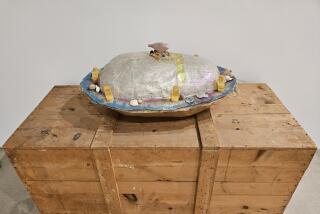Mysterious Origins of a Curious Life
- Share via
The redoubtable Hortense Calisher, who will turn 86 later this year, has just come out with her 20th volume of fiction, “In the Slammer With Carol Smith,” a novel of down and out life in New York City that brings to mind “La Boheme” and its up-to-the-minute rendition, the musical “Rent.”
It’s the story of the psychological and spiritual resurrection of a 36-year-old woman whose past--helping a group of college girlfriends build a bomb--landed her behind bars, in a psychiatric hospital and eventually on the streets as a homeless person. We meet Carol Smith on the mend, living in what she calls a “pad,” receiving regular visits from a social worker, socializing in an abandoned building with other homeless and marginal people, including an actor called Alphonse, and recently taken off an antidepressant and an antipsychotic.
The real action of the novel begins when Carol heads for the street again, eventually to be saved, materially and spiritually, by a “colored” South African actor whom Carol meets through Alphonse.
Early on, we learn that Carol’s parentage is another dimension of her past that is prologue to much that comes later. She was raised by two aunts, now deceased, one of whom, she will learn, was actually her mother, though which one she is never told, and seems never to hazard a guess. Her father was a black man who died in what Carol’s social worker calls “a war” (presumably Vietnam). Carol’s dark skin--at key moments in her life she is mistaken for a servant--makes her an outcast in her white family. Before she learned that an aunt was her mother, she had been told nothing about her mother, not even a name or whether she had died or disappeared. All Carol knows was that the “aunts” had been employers of her father’s family and that raising the orphaned child was noblesse oblige.
As readers of English literature know, orphans--like Tom Jones, Fanny Hill and Oliver Twist--can make terrific characters. Unencumbered by obligation, they are free to invent their futures and ready to be astonished by all they learn about their pasts. But the contortions to which Calisher goes to make Carol an orphan, and a biracial one at that, are unconvincing and don’t finally pack the emotional wallop I think she intends them to.
Though there are a handful of references to Carol’s being black, without them I would have had no clue that she looked any different--or is treated by others any differently from the rich white college girls whose bomb accidentally explodes while Carol is out buying lunch for them. All manage to escape; Carol is caught and does time, which lasts far longer than the number of years she spends behind bars.
There are many beautifully written and stirring passages in this novel, and a range of characters with rich, complex histories, from Carol’s black grandfather, who delivers coal to his granddaughter’s house, to the Pakistani newspaper seller Carol befriends when living in the South African’s apartment. Though we cheer, finally, for Carol, for having conquered her demons and accepted, not only the love of a man but love of herself, there is about the novel a choppiness, an artificiality, that left me feeling that the characters do not exist beyond the page. They know their parts but are not propelled by an internal energy and sense of inevitability. They feel like creatures invented to be moved from scene to scene, situation to situation, by a gifted novelist fascinated by the dramatic outlines of their circumstances and ideas about belonging, selfhood and society that they embody.
Such is the sorry state of publishing that the only other book by Calisher still in print is a 1987 novel, “Age: A Love Story.” In it, a husband and wife in their 70s, fearful of death and life without the other, decide to keep secret journals that will be read only by one of them, when the other dies. It’s a delicious, sexy, deeply moving book that, in contrast to “In the Slammer With Carol Smith,” feels as if it comes from someplace vital in Hortense Calisher.
More to Read
Sign up for our Book Club newsletter
Get the latest news, events and more from the Los Angeles Times Book Club, and help us get L.A. reading and talking.
You may occasionally receive promotional content from the Los Angeles Times.










